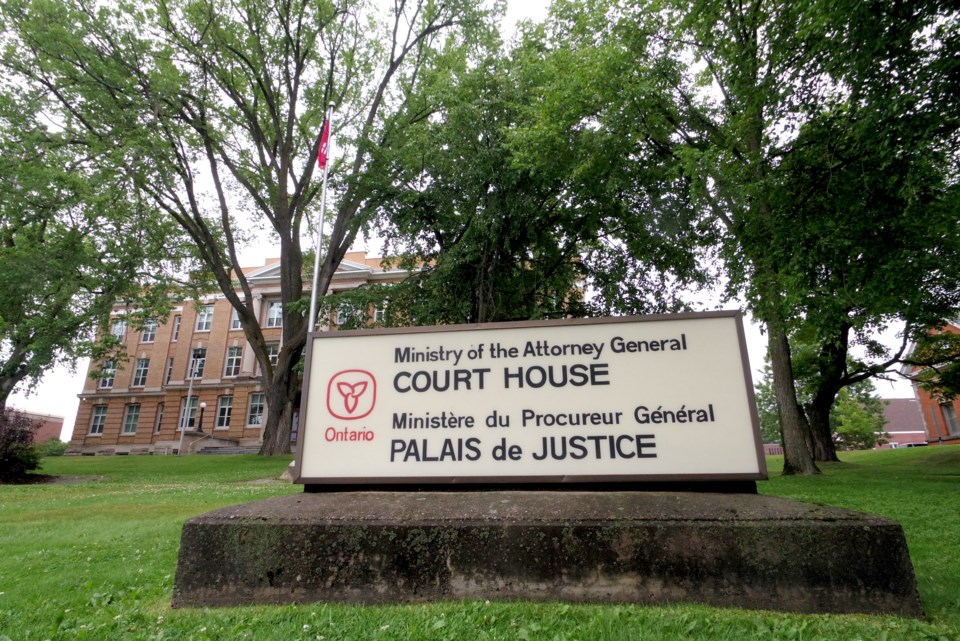There's no question that Brad Southwind and Joseph Topping's friendship was a close one that was tragically grounded in substance abuse and mental health issues, jurors heard Thursday.
The consequences were tragic, predictable and preventable, the Crown said, outlining why Southwind should be found guilty of first-degree murder in his best friend's 2018 stabbing death.
What began as a dysfunctional friendship led to a plan to murder the 31-year-old Topping, because of Southwind's belief from their conversations that he wanted to die, prosecutor David Didiodato said.
"He carefully considered his role as a friend and the best way to help."
Southwind believed he was a medicine man, helping and healing, and devìsed a plan to kill his friend, the assistant Crown attorney said in his 50-minute closing argument.
The men were in Southwind's apartment, they bid their farewells, then went for a 300-metre walk, along a path behind the building, to the murder scene.
Southwind had a black-handled, pointy knife he had taken from his kitchen, pulled it out of his pocket and stabbed Topping.
"This can't be considered spontaneous," Didiodato said. "The reason he stabbed Mr. Topping was to kill him."
He knew his friend was in pain, and "stabbed him again and again and again, 17 times."
While Southwind initially denied his involvement, he ultimately admitted stabbing Topping and kept doing it until the man was dead.
The accused "knew he was dead because his eyes were open and he wasn't breathing," the Crown told jurors.
The more times you stab someone with a formidable weapon, such as a knife, the intention is to cause death, Didiodato said.
The accused stabbed Topping in the neck, chest, face, head and back - the most vulnerable parts of his body.
"He was stabbing to kill."
The murder was planned and was deliberate, and Southwind's remorse led him to confess to police, Didiodato said.
Both Southwind and Topping were schizophrenic.
The accused had chosen to stop taking his medication and turned to street drugs, but there is extremely limited information about his illness at the time of the murder, he said.
Defence lawyer Don Orazietti, pointing to Southwind in the prisoner's box, told jurors "my client sits in a fish bowl with a blank stare, carrying with him medications."
He has acknowledged deliberately killing Topping and pleaded guilty to manslaughter when he was arraigned on the murder charge, Orazietti said.
The Crown rejected that plea and "we have a charge of planning and deliberate murder," he said during his 40-minute closing submission.
Orazietti questioned how what took place was planned and premeditated.
Southwind has schizophrenia, a major mental illness, is paranoid, off his medication and doing street drugs.
His client indicated the two men "were doing all kinds of drugs. They were really messed up, doing some pretty wild stuff," the defence said.
"He doesn't have the ability to plan. He can't plan his way out of a paper bag," Orazietti told the jury. "This is a break with reality."
There is no motive, Topping was his best friend and he has a tremendous amount of remorse.
This killing is a terrible act, but 17 stab wounds is a frenzy, a person out of control and fits perfectly with a detached state, Orazietti said.
A "conviction for first-degree murder is nothing short of hanging."
To say this is a planned, premeditated homicide is "turning our back on the problem (mental illness)," he suggested.
Southwind is a young Indigenous man, who grew up in an unstable situation with lots of alcohol and some drug use, Orazietti said.
"He's not here with any fancy Toronto lawyers ..... we have this picture. You have to make inferences."
Orazietti attacked how the prosecution presented its case, suggesting to jurors it was choreographed to "annihilate what's left" of his client and to impress them.
"They put on a show to get away from the merits(of the case)."
That's what the Crown has done here, "out of vengeance," he said.
The prosecutors have attempted to show Southwind is responsible for first-degree murder.
"He pleaded to manslaughter, that wasn't accepted," he said, calling this an "ill-advised prosecution" with all of "the resources the Crown was able to marshal."
Orazietti said the accused is "the closest thing to a psychiatric report," because the jury can see the condition he's in.
"This case is about how we in society deal with people who are mentally ill," he said.
This isn't first-degree murder, but "the final decision is yours," the veteran lawyer told jurors.
"Do as your conscience tells you," he said, urging them to find his client guilty of manslaughter.
Didiodato countered that there is no doubt substance abuse and mental illness were involved in what occurred.
But Southwind chose to stop taking his medications, decided to self-medicate with crystal meth and decided to murder Topping.
"He is responsible and is guilty of first-degree murder," the Crown said.
